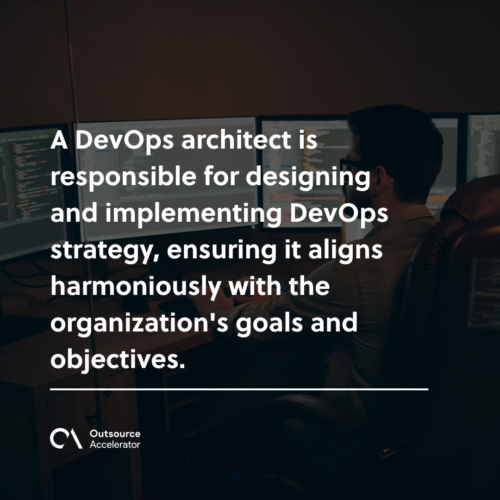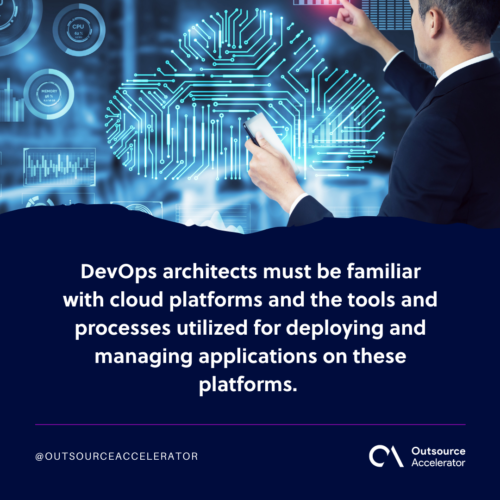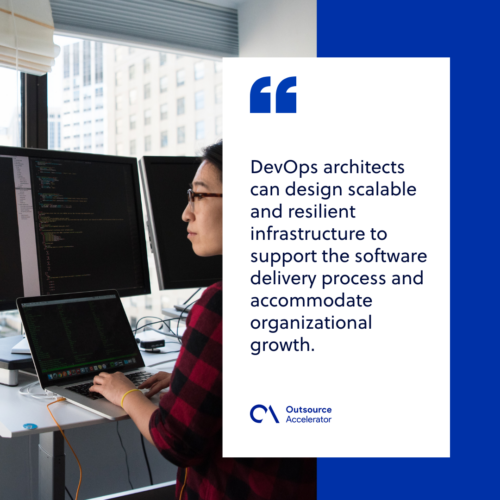Importance of a DevOps architect in modern software development

In the rapidly evolving technology industry, the presence of a DevOps architect has become increasingly indispensable.
DevOps represents a culture, practice, and methodology that emphasizes collaboration and communication between development and operations teams. It aims to deliver software faster and with greater reliability.
A DevOps architect is responsible for designing and implementing DevOps strategy, ensuring it aligns harmoniously with the organization’s goals and objectives.

Roles and responsibilities of DevOps architects
The roles and responsibilities of a DevOps architect encompass crucial aspects integral to the DevOps strategy’s success.
Some key functions of a DevOps architect include:
Defining the DevOps strategy
A DevOps architect is responsible for delineating the DevOps strategy so that it aligns harmoniously with the organization’s goals and objectives.
This entails identifying the tools, processes, and methodologies that will be employed to attain the desired outcomes.
Collaborating with development and operations teams
DevOps architects work closely with both development and operations teams to ensure the effective implementation of strategies and DevOps practices.
This involves fostering a culture of collaboration and communication between the teams, ensuring their harmonious cooperation in pursuing common business goals.
Automating and optimizing software delivery
One of the primary responsibilities of a DevOps architect revolves around automating and optimizing the software delivery process to foster operational efficiency.
These specialists identify areas within the software delivery process that can be automated and implement tools and techniques to streamline the entire procedure.
Designing scalable and reliable infrastructure
DevOps architects possess technical expertise for designing scalable and reliable infrastructure capable of supporting the software delivery process.
They determine the infrastructure requirements and design systems that can seamlessly scale to meet the organization’s demands.
Ensuring security and compliance
A DevOps architect is also accountable for ensuring the security and compliance of the software delivery process in accordance with industry standards and regulations.
This function includes continuous testing and implementation of security measures and processes to safeguard the organization’s data and systems.
Monitoring and performance optimization
Lastly, DevOps architects are responsible for monitoring the software delivery process and identifying areas for improvement.
This encompasses analyzing performance metrics and implementing processes to optimize the overall performance of the software delivery process.
Education requirements of a DevOps architect
DevOps prioritizes collaboration and effective communication between development and operations teams, enabling faster and more reliable software delivery.
To become a DevOps architect, one must possess the following educational prerequisite:
Bachelor’s degree in computer science or a related field
Typically, aspiring individuals are required to hold a bachelor’s degree in computer science or a related field. This degree provides a solid foundation in fundamental computer science principles, such as:
- Programming
- Algorithms
- Data structures
Other relevant fields of study include information systems, software engineering, and computer engineering.
Advanced degrees or certification
Although a bachelor’s degree is the minimum requirement, pursuing advanced degrees or certifications can be advantageous.
A master’s degree in computer science, information systems, or a related field equips DevOps architects with additional knowledge and skills essential for excelling in their roles.
Moreover, a DevOps architect certification at the DevOps Institute serves as evidence of proficiency in DevOps methodologies, tools, and processes.
DevOps Institute certifications
DevOps Institute provides various certifications that assist DevOps architects in showcasing their expertise. These certifications cover many topics, including DevOps culture, continuous delivery, automation, and metrics.
Some prominent DevOps Institute certifications include DevOps Foundation Certification, DevOps Leader Certification, and DevOps Test Engineering Certification.
Cloud certifications
A cloud computing certification exam is also vital in modern software development.
DevOps architects must be familiar with cloud technologies, platforms, automation tools, and processes used to deploy and manage applications on them.
Cloud certifications from reputable providers like Amazon Web Services (AWS) or Microsoft Azure demonstrate a DevOps architect’s proficiency in cloud computing.
Automation and configuration management certifications
Automation and configuration management are critical aspects of the DevOps approach, and DevOps architects must possess expertise in these areas.
Certifications offered by organizations like Chef, Puppet, or Ansible validate a DevOps architect’s proficiency in automation and configuration management tools.
Relevant training and workshops
Attending DevOps training sessions and workshops helps DevOps architects stay updated with the latest tools, technologies, and best practices in the field.
Numerous organizations offer training programs and workshops focusing on DevOps principles, tools, and processes.
Practical experience
Practical experience holds significant importance for DevOps architects. It means they have hands-on involvement in infrastructure management and monitoring and comprehensive knowledge of DevOps Platform tools such as Chef, Puppet, and Docker.
Further, proficiency in the following tools and processes is also crucial:
- Automation and orchestration tools
- Cloud platforms
- Containerization technologies
- Infrastructure-as-Code (IaC) tools and processes
- Version control systems
- DevOps tools for monitoring and logging
- Scripting and programming languages
- Networking and security principles and best practices
- Integration and deployment (CI/CD) tools
Continuous learning of DevOps practices
A DevOps architect must possess an unwavering commitment to continuous learning. The DevOps field constantly evolves, necessitating up-to-date knowledge of the latest tools, technologies, and best practices.
Embracing continuous learning and pursuing professional development is essential for sustained success as a DevOps architect.

Skills and qualifications of a DevOps architect
When hiring DevOps architects, note that top-tier candidates have the following technical and soft skills:
DevOps architect: Technical skills
Here are some of the key technical skills required for a DevOps architect:
Proficiency in automation and orchestration tools
A DevOps architect must have in-depth knowledge of automation and orchestration tools. These tools streamline the software delivery process.
Expertise in cloud platforms
DevOps architects must be well-versed in cloud platforms. They must also know the tools and processes utilized for deploying and managing applications on these platforms.
Ability to use containerization technologies
A DevOps architect needs to be highly skilled in containerization technologies. These tech innovations are instrumental in packaging and deploying applications.
Familiarity with Infrastructure-as-Code
Infrastructure-as-Code (IaC) tools and processes are crucial for a DevOps architect. IaC automates the deployment and management of infrastructure.
Mastery of version control systems
A DevOps architect’s proficiency in version control systems is another vital factor. These systems help manage code changes and deployments effectively.
Adeptness in monitoring and logging tools
Monitoring and logging tools identify issues and optimize software performance. A reliable Devops architect must showcase the ability to utilize these tools effectively.
Scripting and programming languages
A DevOps architect must be proficient in:
- Scripting languages
- Coding languages
- Programming languages
These are also crucial in automating processes and building applications, especially in cloud based environments.
Networking and security
DevOps architects must be familiar with networking and security principles and best practices. Being aware of these elements helps them safeguard the software delivery process.
Continuous integration and deployment (CI/CD)
Proficiency in continuous integration and deployment (CI/CD) of appropriate tools and processes is vital to automating the software delivery process.
DevOps architect: Soft skills
In addition to technical skills, a DevOps architect requires specific soft skills, which include:
Communication and collaboration
Excellent communication and collaboration skills are crucial for DevOps architects. These skills allow them to work effectively with development and operations teams.
Leadership and team management
A DevOps architect must have a strong team management and leadership mindset to lead and oversee cross-functional teams.
Effective leadership fosters a culture of trust, accountability, and continuous improvement, which are essential for DevOps practices and development teams.
On the other hand, good team management helps:
- Coordinate efforts
- Resolve conflicts
- Maintain high morale
All of these elements contribute to a better software development lifecycle and more reliable system operations.
Problem-solving and critical thinking
Strong problem-solving and critical thinking skills enable these specialists to identify issues and implement effective solutions.
Effective problem-solving ensures that system disruptions are minimized and that solutions are both innovative and efficient.
Critical thinking allows DevOps professionals to:
- Evaluate the impact of their decisions
- Foresee potential challenges
- Make strategic choices that enhance system reliability and performance
These are vital for optimizing workflows, improving automation processes, and ensuring the seamless integration of development and technical operations.
Adaptability and flexibility
DevOps architects must be adaptable and flexible to thrive in a fast-paced and ever-changing environment. These enable them to swiftly adjust to new tools, methodologies, and changes in project scope or business needs.
Being adaptable ensures that they possess the capability in terms of implementing devops practices and current innovations to maintain efficient and effective workflows.
Flexibility allows them to pivot strategies in response to unexpected challenges, ensuring continuous delivery and deployment without compromising on quality.
Attention to detail and organization
Excellent attention to detail and organization skills are vital for a DevOps architect to manage complex projects and processes successfully.
Attention to detail helps in identifying and resolving potential issues before they escalate, ensuring that all aspects of the infrastructure are correctly configured and maintained.
Organization is crucial for managing multiple tasks, projects, and workflows efficiently, enabling seamless coordination between development and operation teams.
Benefits of hiring a DevOps architect
A DevOps architect can provide numerous benefits for organizations. Seasoned DevOps experts help organizations achieve their business objectives more quickly and efficiently.
Below are the primary advantages of employing these specialists:
- Accelerated software delivery – Certified DevOps can expedite the software delivery process by implementing automation and optimization techniques.
- Improved collaboration and communication – The presence of this specialist enhances collaboration and communication between development and operations teams, leading to improved outcomes.
- Scalable and resilient infrastructure – DevOps architects can design scalable and resilient infrastructure to support the software delivery process and accommodate organizational growth.
- Enhanced system performance and reliability—A DevOps architect can enhance system performance and reliability by optimizing the software delivery process.
- Continuous improvement – A DevOps architect can assist organizations and industry leaders in implementing continuous improvement processes, resulting in better outcomes and increased efficiency.

The role of a DevOps architect in modern software development
A DevOps architects’ role in modern software includes the following:
- Designing and implementing the DevOps strategy
- Collaborating with operations and DevOps team
- Automating and optimizing software delivery
- Designing scalable and reliable infrastructure
- Ensuring security and compliance
- Continuous monitoring and optimizing performance
With the right education, skills, and qualifications, these specialists can rapidly drive organizational agility.
Besides accelerating software delivery, they can help build scalable and resilient infrastructure, enhance system performance and reliability, and provide continuous improvement.







 Independent
Independent




